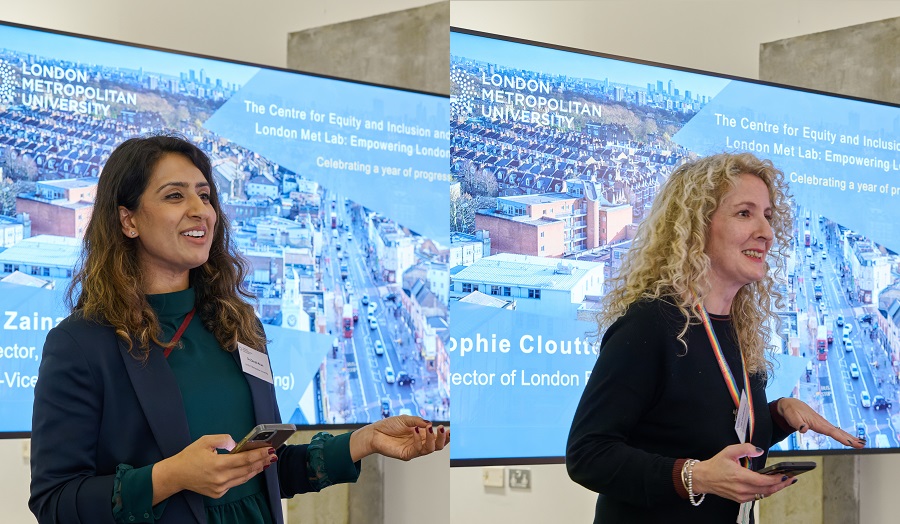An anniversary event was held to celebrate the first year of the University's major civic engagement initiative, the London Met Lab, and its sector-leading Centre for Equity & Inclusion
Date: 25 November 2021
London Metropolitan University celebrated the first year successes of its flagship civic engagement initiative, the London Met Lab; and its sector-leading Centre for Equity & Inclusion, which focuses on addressing inequalities within Higher Education.
Mayor of London Sadiq Khan delivered a video address to approximately 100 London Met staff, students, partners and key figures from the local community, who were in attendance to mark the achievements of the Lab and the Centre over the last year.
Since its launch in 2020, the London Met Lab has partnered with over 600 organisations including local authorities, charities, NHS trusts, social enterprises and businesses, taking practical action to make the capital healthier, fairer and more just.
The Lab works to bring London Met’s academic expertise to co-create solutions to the social challenges which disproportionately affect the communities that the university serves. For example, through research projects exploring Covid-restriction compliance in North London; developing a public health framework for youth knife crime in Camden; developing new public artworks, designed by students, to Aldgate’s Petticoat Lane Market; and bringing students to plant over 400 trees in Tower Hamlets.
The Centre for Equity and Inclusion, also officially launched in 2020, sits at the heart of London Met as the ideological driving force behind its pedagogy, student experience and workplace culture. The Centre has become the catalyst through which London Met actualises its commitment to social justice.
The Centre has recently launched its Race Equity Strategy, which aims to transform the experience of Black and minoritised students at the University, act as a catalyst for changes across the sector, and build links between the University and the local community. Through the Centre, London Met students have the opportunity to partner in equity programmes which, for example, seek to improve the curriculum, inclusivity of the student experience and raise awareness of important issues such as sexual violence.
Deputy Mayor of London for Planning, Regeneration and Skills, Jules Pipe, said: "As London recovers from the pandemic, we are working hard in City Hall to ensure the capital becomes a greener, fairer, safer and more prosperous city. I would like to congratulate the University on the first anniversary of the London Met Lab and the Centre for Equity and Inclusion, and all the work they have done so far in helping to create a city that reflects the communities that call it home."
Vice-Chancellor of London Met, Professor Lynn Dobbs said: "Throughout the pandemic, London Met's staff and students have responded to the call for action to support our wonderful city through knowledge-exchange initiatives and on-the-ground activities.
Nowhere exemplifies this better than our London Met Labs and the Centre for Equity and Inclusion, which despite the constraints of COVID-19, have led the way in civic engagement and social justice. Together, we have worked to further the ambitions of the many brilliant social enterprises, businesses and civic organisations in our city who are equally committed to ensuring inclusive economic and social recovery."
Director of the Centre for Equity and Inclusion at London Met, Dr Zainab Khan said: "The challenges of inequality in Higher Education are well documented. The Centre for Equity and Inclusion, in partnership with staff and students across London Met is dedicated to addressing disparities in order to deliver fair outcomes and authentic inclusion.
"The publication of our first year activities is an open invitation to the sector to join in undertaking more progressive equity work. There is much work to be done and I am so proud of what this team of trailblazers has achieved so far.
Director of London Engagement at London Met, Sophie Cloutterbuck said: "Over the last year, the London Met Lab has worked with stakeholders in the local community to find solutions to some of the greatest challenges facing London. Whether it is investigating the drivers of crime, working to support local people’s health and employment, or creating innovative projects to ensure that London becomes carbon neutral, we are tackling crucial issues head-on alongside many partners from business, local government and civic society."

Left: Professor Zainab Khan, Right: Sophie Cloutterbuck
